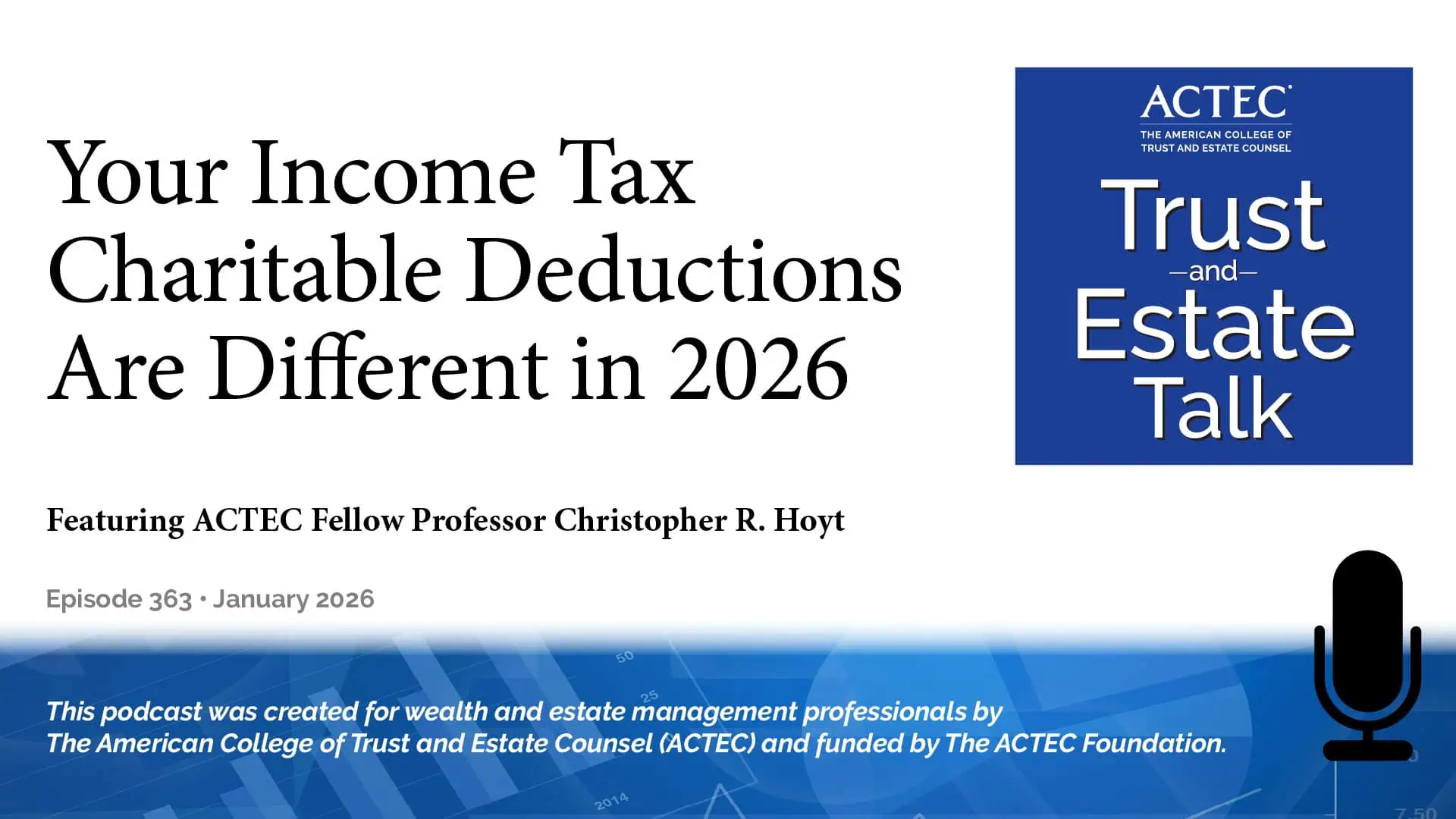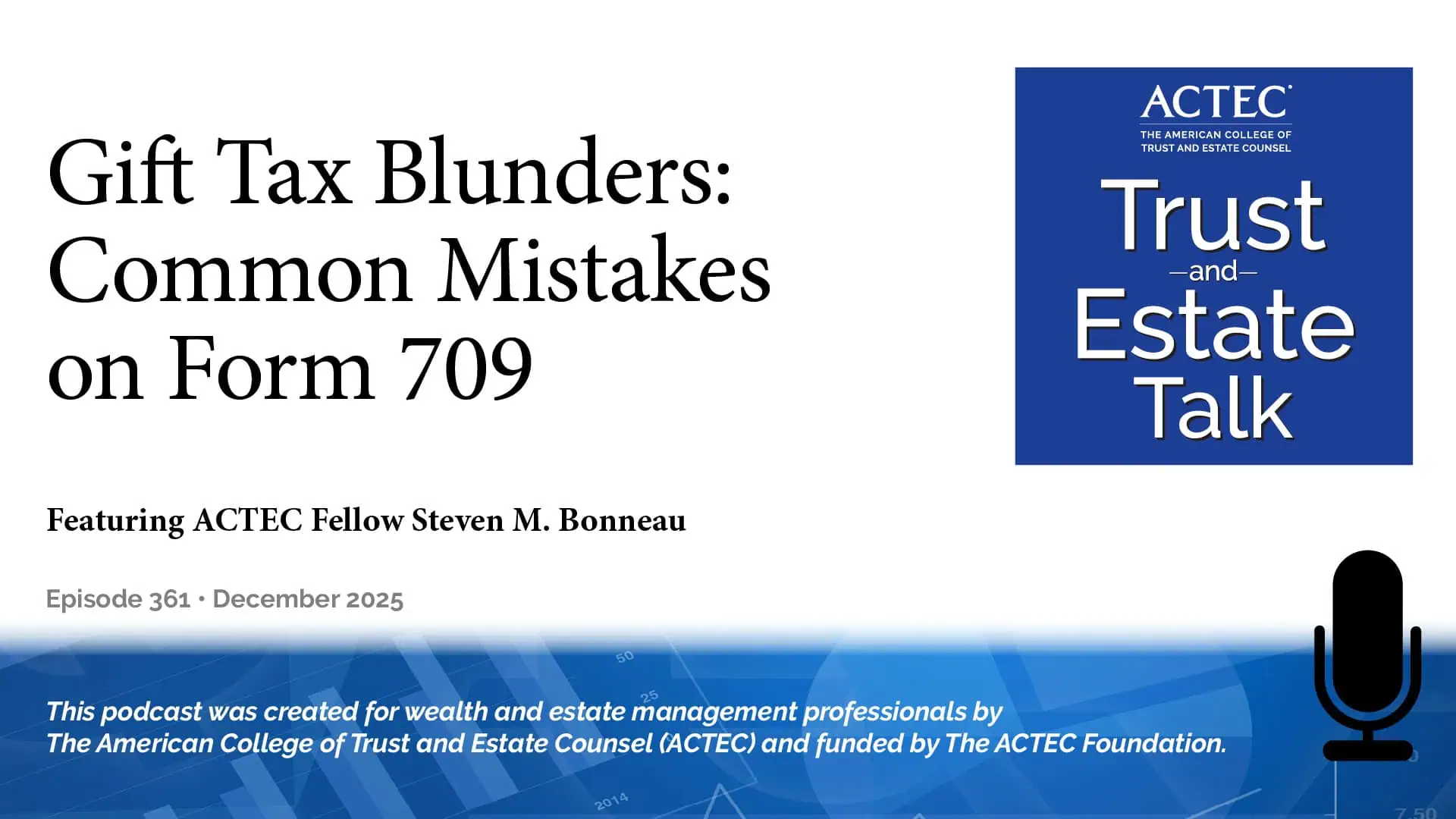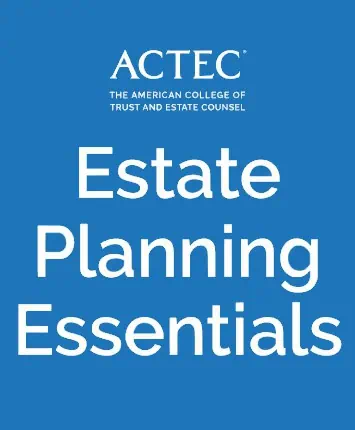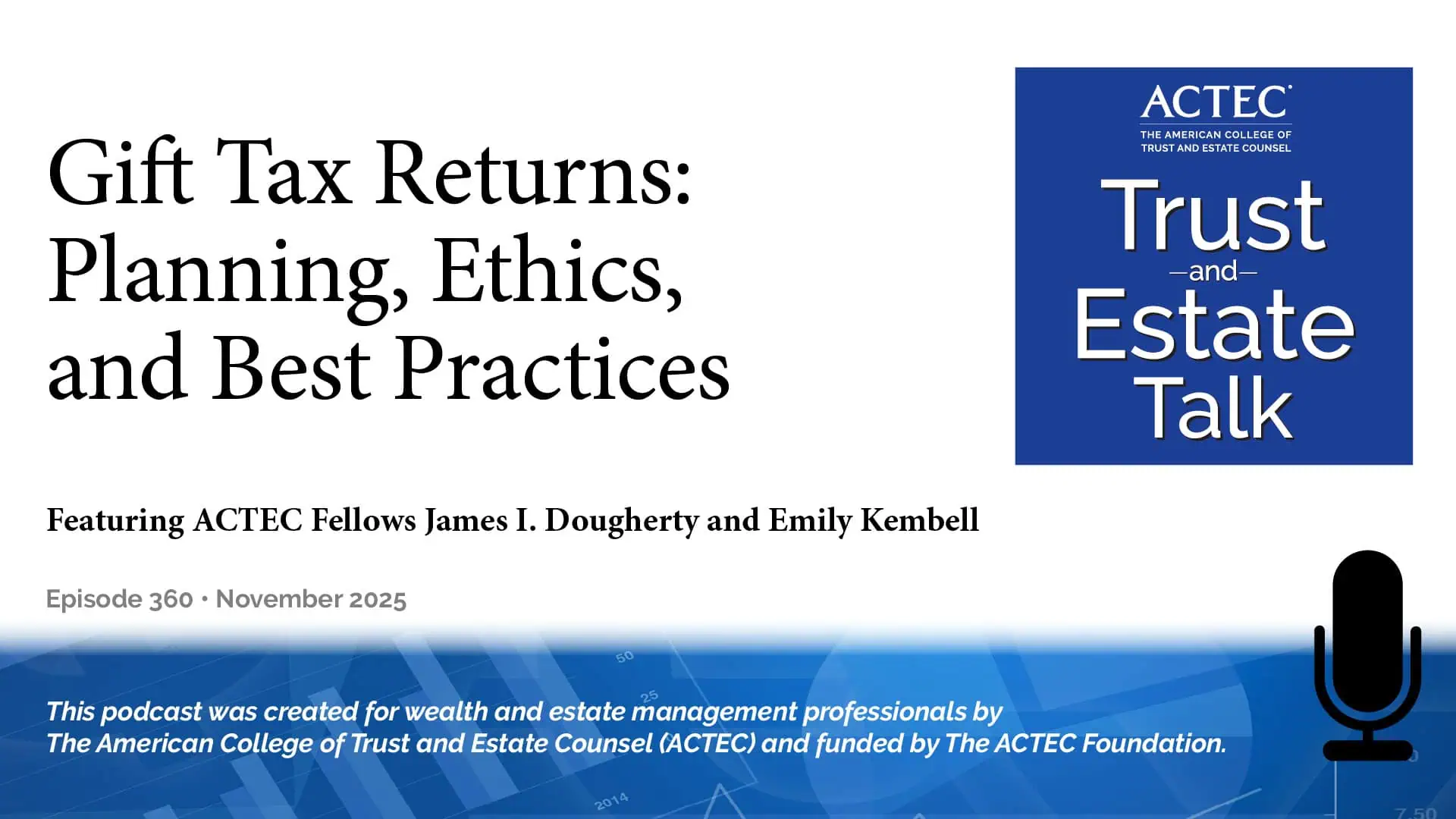Fiduciary Income Tax Planning of Distributions In-Kind and Specific Bequests
“Fiduciary Income Tax Planning for In-Kind Distributions and Specific Bequests,” that’s the subject of today’s ACTEC Trust and Estate Talk.
Transcript/Show Notes
This is Travis Hayes, ACTEC Fellow from Naples, Florida. When a fiduciary distributes property to a beneficiary, the fiduciary may either distribute the property in cash or in-kind. In-kind distributions can have a significant impact on the beneficiary, estate, or trust if the fiduciary is not considering the various tax consequences.
ACTEC Fellow Christiana Lazo of New York City joins us today to discuss these issues and the income tax planning involved with in-kind distributions and specific bequests. Welcome, Christiana.
Christiana Lazo: Thank you and thank you for joining us today for this discussion. So this will be a quick snack-size discussion around the issues that come up when we’re contemplating distributions in-kind and specific bequests. Let’s start first with distributions in-kind. There are three big questions that I like to ask myself when I’m contemplating a distribution in-kind and the effect that that distribution may have on the estate or trust and its beneficiary receiving the distribution.
Key Questions for In-Kind Distributions
The first is, will that distribution in-kind cause the estate or trust to recognize gain or loss? The second is, what will the beneficiary’s basis be on the property received from that distribution? And the third is, what will the income tax consequences be for that beneficiary from the distribution?
Question 1: Gain or Loss Recognition
Let’s start with the first question on gain or loss recognition by the estate or trust. The general rule here is that a distribution in-kind should not result in recognition of gain or loss for the estate or trust. But, as we always know when we hear a general rule, there are exceptions to that general rule. What are those exceptions?
A distribution in-kind will result in a recognition of gain if that distribution is in satisfaction of a pecuniary gift or request. So, trustee is supposed to distribute $10,000 to Jane and the trustee distributes ABC stock to Jane in satisfaction of that pecuniary gift or request. That’s a situation where gain or loss may need to be recognized.
The second exception is if the distribution is in satisfaction of a right to income and that income was not realized in-kind. Again, the same concept here. There’s a beneficiary having a right to receive something and that right is being satisfied by something else.
The third exception, again, same vein, is where a beneficiary has a right to receive a specific piece of property, and that right is satisfied instead with another piece of property in-kind.
Now, it’s important that we consider gain different from loss because there are loss disallowance rules that often are going to disallow the recognition of loss when an estate or trust distributes property in-kind, even if that same distribution would have resulted in a recognition of gain.
Loss Disallowance Rules
Those loss disallowance rules are found in Section 267 of the Code. There is one big exception here to the loss disallowance rules and that’s when an estate distributes property in-kind in satisfaction of a pecuniary request. That exception is found in 267(b)(13) and that exception is going to turn off those loss disallowance rules- again, only in the context of an estate- and will lump in here a trust that’s elected to be taxed like an estate under Section 645. But other than that, there’s no exception to a trust that hasn’t elected to be taxed as an estate.
Planning Considerations Takeaways
What does this mean for us as planners? When we’re drafting, we need to be careful about how we draft those rights that a beneficiary may have to receive distributions, and when we’re administering trust and estates, we need to be thoughtful around the administration and understand when a distribution may result in a recognition of gain or loss.
Question 2: Beneficiary’s Basis
Let’s move on to the second question here and that’s the recipient’s basis. When a beneficiary receives a distribution in-kind from an estate or trust, the beneficiary’s basis is generally going to be the trust’s or estate’s basis, but not surprisingly we’ll be adjusting that basis for any gain or loss that was recognized on the distribution.
Question 3: Income Tax Consequences
And finally, what are the income tax consequences to the beneficiary from that distribution? And- the corresponding question is- what will the trust or estate’s distribution deduction be from the distribution? So again, we’re going to consider the beneficiary as having received the lesser of the basis or the fair market value, but, if there was an election made to recognize gain, then we’re going to treat the beneficiary as having received the property at the fair market value.
Exception: Electing to Recognize Gain
That brings me to another exception to the general rule on when gain or loss is going to be recognized by an estate or trust. There is the opportunity for a fiduciary to elect to recognize gain on a discretionary distribution that’s made to a second-tier beneficiary of a trust. Once that election is made, that election is going to apply to all distributions in that same taxable year.
And, importantly, that means that it may also apply to distributions where there might have been a loss recognized but for our loss disallowance rules. So, it’s really important as we’re working through the decision of whether or not to make that election to recognize gain on a qualifying distribution, we need to think about the other distributions that are being made in that year and whether the election may cause loss disallowance rules to disallow a loss on a distribution that might otherwise have resulted in a loss.
So as a planning point, again, because of these loss disallowance rules, we should also consider whether it’s necessary to distribute property in-kind. If a loss property is distributed in-kind, the loss disallowance rules may disallow the loss, but in the alternative, if the fiduciary were to sell that property and then distribute the proceeds of the property, that would be an opportunity for the loss to be allowed and the beneficiary to perhaps receive the same amount without that penalty of disallowing loss.
Specific Bequests and Section 663(a)(1)
One final point before we conclude today is to recognize that these rules around distributions in-kind are separate and apart from the question of whether or not a distribution is a specific bequest. So we have the specific bequest rules in Section 663(a)(1) and those rules are a Subchapter J equivalent that help us identify when we can treat a distribution from a trust like a distribution of property that would be excluded from income under Section 102.
Requirements for Specific Bequests
Those requirements under 663(a)(1) would require the distribution to be properly paid under the terms of the governing instrument, be of a specific sum or of specific property, be it ascertainable either at the date of death or at the inception of a trust, be payable in no more than three installments, and not be required to be paid from fiduciary accounting income.
When you’re running through this question of whether or not a distribution in-kind is going to result in the recognition of gain or loss, we’re not necessarily trying to map that onto the question of whether or not that same distribution does or does not qualify as a specific bequest under Section 663(a)(1).
Travis Hayes: Thank you, Christiana, for providing a refresher on fiduciary income tax planning relating to in-kind distributions and specific bequests.
Additional Resources
- Planning Ahead for the Sunsetting of the Tax Cuts and Jobs Act Exemptions (May 2024)
- A Trustee’s Duty to Minimize State Income Tax (Feb 2024)
Resources to Share with Your Clients:
Latest ACTEC Trust and Estate Talk Podcasts

Your Income Tax Charitable Deductions Are Different in 2026
Learn how the 2026 tax law changes impact charitable deductions, SALT limits, and QCD planning—especially for donors over age 70½ and high-income taxpayers.

Loss of the Portability Election: Estate of Rowland v. Commissioner
A look at Estate of Rowland v. Commissioner and how incomplete estate tax returns can void a portability election and cost estates valuable DSUE.

Gift Tax Blunders: Common Mistakes on Form 709
Common Form 709 mistakes can trigger costly GST and gift-tax consequences. ACTEC experts explain how to spot and fix DSUE, GST allocation, and gift-splitting errors.



